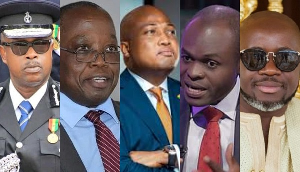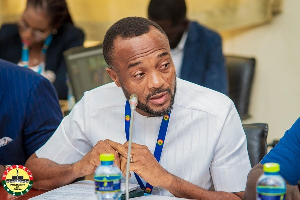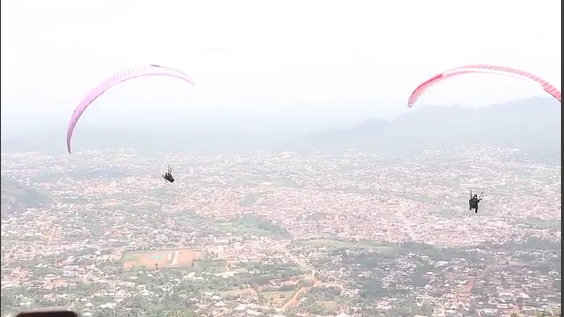As the National Democratic Congress (NDC) administration progresses in implementing its ambitious Operation Recover All Loot (ORAL) policy following its historic election victory, calls are mounting for the initiative to go beyond politicians and reach the uncharted territories of traditional leadership.
Leading this charge is Raymond Ablorh, a respected columnist and activist, pushing for a radical extension of ORAL to target corruption within the chieftaincy institution, long shielded from public scrutiny.
Ablorh’s intervention, made in a strongly worded commentary, poses an urgent and uncomfortable question: Is chieftaincy above accountability?
“For decades, traditional institutions have increasingly become sites of unregulated power, land expropriation, title racketeering, and impunity.
“And nowhere is this more evident than in Gomoa, where the throne has become a front for landguard activity, systemic corruption, and the desecration of sacred customs.”
Raymond Ablorh, seasoned Columnist and Activist
He pointed to Gomoa in the Central Region as a striking case study—a place where the sanctity of the stool, once a symbol of cultural stewardship, has allegedly morphed into a bastion of criminality.

There, Ablorh claimed, a destooled chief continues to operate unlawfully, relocating palaces, establishing private shrines, selling stool lands without the consent of traditional families, and deploying landguards to suppress dissenters.
These, he says, are no longer traditional practices but acts of “monarchic banditry”, yet Ablorh decried that no state institution has stepped in—not the Lands Commission, not the Economic and Organised Crime Office (EOCO), not even the Office of the Special Prosecutor (OSP).
“Is it because chieftaincy sits in a grey zone that neither Parliament, EOCO, the Lands Commission, nor the Auditor-General wants to touch? Well, that grey zone is now red with conflict, injustice, and fear”.
Raymond Ablorh, seasoned Columnist and Activist
The immunity enjoyed by chiefs, he argued, has created a convenient loophole for what he termed “criminal enterprise in cloth and beads.”

A Broader Mandate for ORAL
Originally envisioned to target politically exposed persons who have illegally amassed wealth at the state’s expense, ORAL is fast becoming a rallying cry for justice and recovery in the public interest.
But Ablorh insisted it must not stop at politicians, asserting that if a DCE or MP must account for misused state funds, then a “chief who hijacks stool land, sells it illegally, and arms landguards to silence dissent” must equally be held accountable.
He believes that any meaningful fight against corruption must not exempt traditional authorities, especially those who have turned stools into land-racketeering enterprises.
The argument is a stark departure from the conventional hands-off approach to chieftaincy, a sector seen as culturally sacred but increasingly susceptible to abuse.
“So we ask the NDC, EOCO, CHRAJ, Lands Commission, and the OSP: Will ORAL cover stolen stool lands in Gomoa, Awutu, Agona, and Mankessim? Will traditional leaders who have turned their stools into land racketeering syndicates face scrutiny? Or will we audit the finances of palaces and stools just as we audit MMDCES and ministries?”
Raymond Ablorh, seasoned Columnist and Activist
For him, the failure to do so would render ORAL incomplete—another promising anti-corruption drive undermined by selective application.
“No King Is Beyond the Law”
Ablorh framed his plea not as an attack on Ghana’s cherished customs but as a defense of accountability and justice.
“Chieftaincy is not a private company,” he emphasised, adding that. “It is a public trust, funded by stool lands, governed by national laws, and protected by the Constitution.”
His call to action is simple yet profound: Ghana needs a Chieftaincy Accountability Act. Such a legal instrument, he argued, would bring much-needed oversight to traditional institutions, preventing them from serving as safe havens for looted national resources and impunity.

In the absence of such measures, Ablorh fears that ORAL may degenerate into “Operation Selective Recovery”—a noble idea crippled by its own blind spots.
The lesson from Gomoa, he cautioned, is clear: ignoring the rot within the chieftaincy system risks igniting future conflicts akin to those seen in Bawku.
In closing, Ablorh issued a powerful reminder that echoes beyond the specifics of Gomoa or the NDC’s manifesto.
“The land belongs to the people, not the few,” he declared, and with that, he called for a national reckoning—not just of stolen funds, but of stolen trust.
If Ghana truly desires to reclaim every cedi and every acre taken unlawfully, the accountability net must be cast wide, covering the crown as well as the cassock, the politician as well as the palace.
For justice to be complete, it must be blind to status, but sharp against corruption in all its forms.
READ ALSO: Government, ARB Apex Bank Sign $1m Agriculture Fund Deal





















